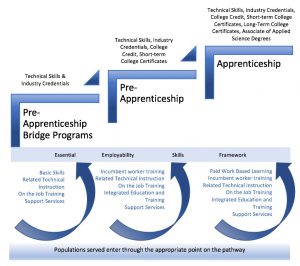The Illinois Community College Board (ICCB) has worked with other partners in a statewide effort to expand apprenticeship in multiple sectors. In FY2019, half of our 48 community colleges provided apprenticeship opportunities to more than 1900 individuals through various employers throughout the state. The primary focus of these apprenticeship programs have been in the construction/manufacturing trades (around 85%-90%).
In an effort to continue these expansion efforts, in October 2018 the ICCB submitted an application to the U.S. Department of Labor’s (DOL) for the Scaling Apprenticeship Sector Strategies Grant. The ICCB applied on behalf of the community college system and received $3,999,400 over four years (July 15, 2019 – July 14, 2023) to develop and support the Customized Apprenticeship Programming – Information Technology (CAP-IT).
| Participating Colleges City Colleges of Chicago Illinois Central College Joliet Junior College Kishwaukee College College of Lake County Lincoln Land Community College Oakton Community College Parkland Community College Rend Lake College Richland Community College |
Project Goals
Expand existing industry-led customized apprenticeships through IT sector partnerships Innovate new apprenticeship models for pilot and expansion Scale and expand apprenticeship model nationally through partnerships with Jobs for the Future and Harper College |
Project Focus:
The project will focused on high-demand occupational pathways in the Information Technology Pathway Sector and use a model that will allow multiple on ramps for apprentices at various skill levels. The model below includes:
- Pre-apprenticeships –bridge programs;
- Pre-apprenticeship with related instruction such as integrated education and training; and
- Apprenticeships, both non-registered and registered.
Project Goals:
- Expand existing industry-led customized apprenticeships through IT sector partnerships by:
- incorporating pre-apprenticeship models (Bridge Programs, Integrated Education and Training), Essential Employability Skills Framework, support services, and paid work-based learning resulting in industry recognized credential(s)
- developing program models inclusive of incumbent worker outreach and upskilling strategies, such as in-house training and prior learning assessment
- Innovate new apprenticeship models for pilot and expansion that:
- utilize new approaches for acceleration and flexibility, including competency-based education delivery and shorter-term and accelerated programs
- partner with CompTIA to scale industry credentials and address emerging industry skillsets related to cybersecurity
- result in family-sustaining employment
- Scale and expand apprenticeship model nationally through partnerships with Jobs for the Future and Harper College
- emphasizing partner recruitment, a strong external communication and dissemination plan, and professional development/coaching activities related to model expansion b) articulating a continuous improvement and national replication strategy
